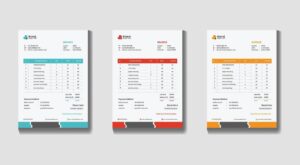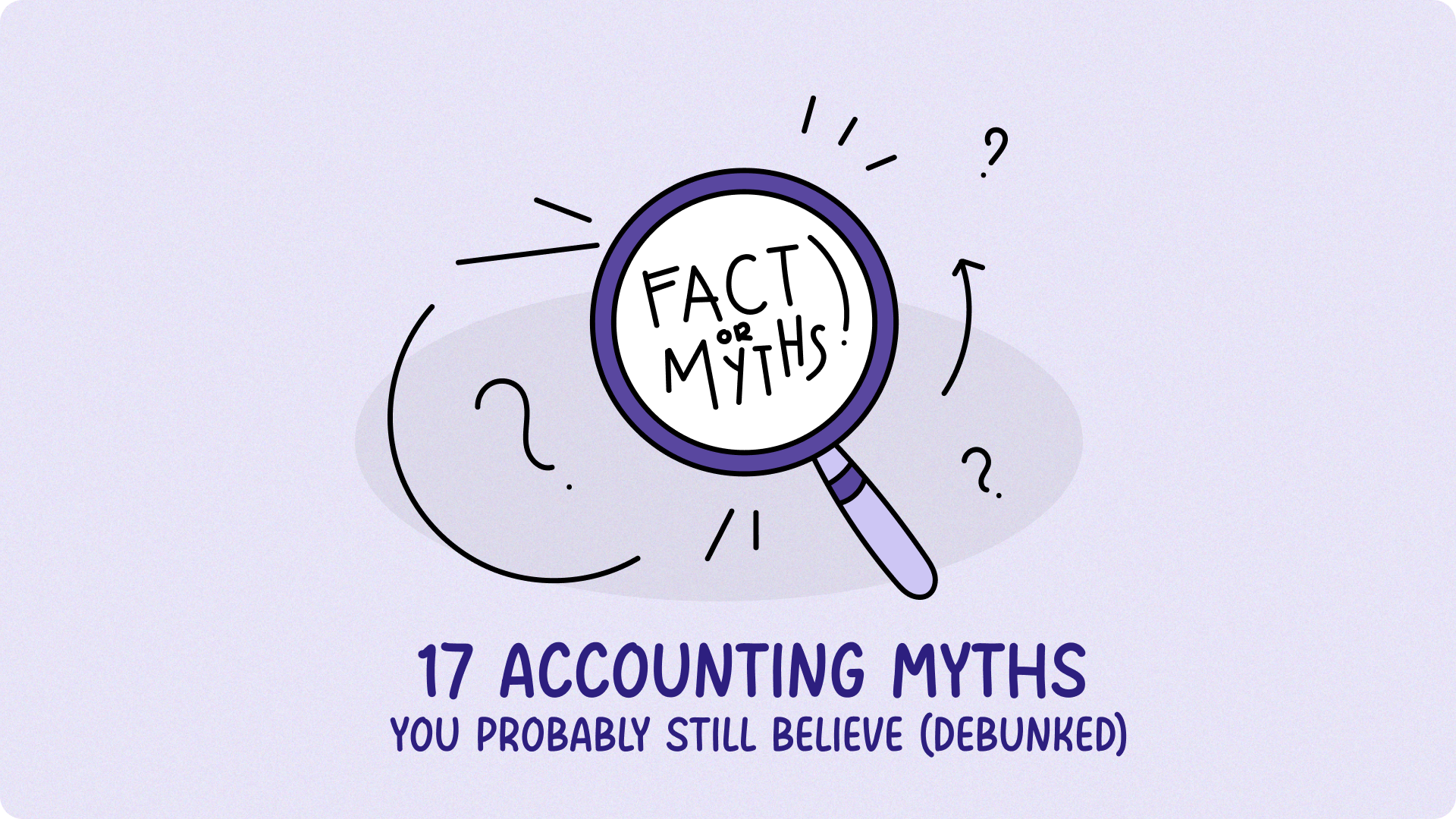Most of us dive into freelancing or small-business ownership for the work itself—designing, consulting, baking. The last thing we signed up for was bookkeeping. Yet every conversation comes with unsolicited “advice” from well-meaning friends or relatives: “Just write off everything!” or “You don’t need records—just save your bank statements.” Those myths don’t just create unnecessary stress—33% of small-business owners report they regularly lose sleep over money worries—and they can cost you real dollars if left unchecked.
We didn’t get into business to become accountants, so it’s easy to fall for these misconceptions. Let’s debunk these myths and give you the clarity to manage your finances confidently.
Myth 1: Accounting is only for tax season.
Reality: Accounting is a year-round activity that gives you a real-time pulse on your business’s health.
Why It Matters: Scrambling for records in March or April creates stress, missed deductions, and rushed decisions. Reviewing your books monthly, or even weekly, lets you spot small issues, improve cash flow, and cut costs before they spiral out of control.
Myth 2: I’m too small to need formal accounting software.
Reality: Spreadsheets are prone to errors and can’t scale with your business. In fact, research indicates that up to 88% of spreadsheets contain significant mistakes.
Why It Matters: I’ve been there. My first year I tracked everything in a spreadsheet. A single misplaced formula almost cost me $500 in underreported income. Modern cloud software is affordable, automates data entry, and lets you connect your bank feed, so you save hours and get a clearer financial picture.
Myth 3: I can write off 100% of my home-office costs.
Reality: You can only deduct the portion of your home used exclusively and regularly for business.
Why It Matters: Over-claiming this deduction is a classic IRS red flag. You can choose the simplified method (up to $1,500) or the actual-cost method (allocating mortgage, utilities, insurance). Use whichever yields the bigger benefit, but only for truly dedicated office space.
Myth 4: A business credit card can replace a business bank account.
Reality: A credit card lets you borrow money, while a bank account is where your business’s cash actually lives. You need both, but a separate business bank account is especially important to manage funds properly.
Why It Matters: Mixing personal and business money in one account can strip away your LLC’s liability protection, exposing your personal assets if things go wrong. It also turns bookkeeping and tax preparation into a tangled mess. A dedicated business bank account keeps your finances clear, simplifies reconciliations, and ensures your legal and financial records stay rock solid.
Myth 5: I don’t need to save receipts if I have a bank statement.
Reality: The IRS requires proof of purchase, and bank statements alone don’t show what you actually bought
Why It Matters: Picture an auditor asking what a $200 Amazon charge covered. A bank statement alone won’t prove it was for a printer rather than a TV. Instead, digitize and tag every expense as it happens using receipt-capture apps like Dext or QuickBooks Snap.
Myth 6: Profit is the same as cash flow.
Reality: Your profit on paper may look healthy, but cash flow measures the actual dollars in your account that keep your business running. It’s a crucial difference, and an Intuit study found that 61% of small-business owners struggle with cash-flow issues.
Why It Matters: Your Income Statement can show a big profit, but if clients haven’t paid, you can’t pay your bills. This is the single most critical survival concept.
Myth 7: I can pay myself whatever’s left in the business account.
Reality: You must set aside money for taxes and business savings before paying yourself.
Why It Matters: Following Mike Michalowicz’s “Profit First” principle means you allocate percentages to tax and profit accounts before paying yourself. This approach prevents the panic of facing a large tax bill with no funds set aside.
Myth 8: Bartering (trading services) isn’t taxable.
Reality: The fair market value of services received in a trade counts as taxable income.
Why It Matters: If a web designer trades $2,000 of work for $2,000 of photography, each party must report $2,000 of income. Don’t let “free” trades cost you in unreported revenue.
Myth 9: An accountant is too expensive for my small business.
Reality: A good accountant saves you more money than they cost.
Why It Matters: They prevent mistakes, uncover deductions, and save you hours of work. For example, a $2,000 annual fee is repaid when you reclaim just 40 hours of time—hours you can spend on billable work or growing your business. This makes an accountant an investment, not an expense.
Myth 10: My bookkeeper and my tax preparer are the same thing.
Reality: Bookkeeping is daily transaction recording, while tax preparation is annual return filing.
Why It Matters: Clean, year-round books speed up tax season and reduce preparation costs because your accountant can work directly with accurate, organized records.
Myth 11: I can deduct the cost of my commute to my office or co-working space.
Reality: Commutes from home to your primary workplace are non-deductible, but you can deduct business trips beyond that, such as driving to client meetings.
Why It Matters: Misclassifying personal travel as business mileage invites audit scrutiny. Only log miles driven for business purposes beyond your usual commute.
Myth 12: Estimated taxes are optional.
Reality: If you expect to owe more than $1,000 in tax, you must pay quarterly estimated taxes.
Why It Matters: The U.S. is a “pay-as-you-go” system. Missing estimated payments triggers underpayment penalties—just like an employee missing withholding.
Myth 13: Putting ‘LLC’ after my name protects me from everything.
Reality: An LLC shields personal assets from business debt, but it doesn’t protect you from professional negligence or from commingling personal and business funds.
Why It Matters: If a client sues over an error or omission, your LLC structure will not prevent a negligence claim and your personal assets could still be at risk. Beyond separating business and personal finances, you need professional liability insurance and strong internal controls to guard against these exposures.
Myth 14: Depreciation is too complicated to worry about.
Reality: Depreciation simply spreads the cost of a big asset (computer, vehicle) over its useful life.
Why It Matters: By using Section 179 or Bonus Depreciation, you can often deduct the entire cost of qualifying assets in the year they’re placed in service. This immediate write-off lowers your taxable income today and frees up cash to reinvest in your business.
Myth 15: I don’t need to track minor cash expenses.
Reality: Small costs add up to significant deductions over a year.
Why It Matters: That $5 parking fee or $15 coffee meeting might feel trivial, but weekly they become $1,000+ in potential write-offs. Track every receipt.
Myth 16: Since my business lost money, I don’t have to file a tax return.
Reality: You still must file, and you can often carry a Net Operating Loss (NOL) forward to offset future profits.
Why It Matters: Filing preserves that loss, reducing taxable income in profitable years. Not filing means leaving that benefit on the table.
Myth 17: Hiring a bookkeeper means I can ignore my finances.
Reality: A bookkeeper manages your day-to-day transactions, but you are ultimately responsible for understanding your financial health and making strategic decisions.
Why It Matters: Your bookkeeper tracks transactions, but only you can spot trends, adjust pricing, or catch costly errors. Regularly glance at your Profit and Loss (P&L) statement, Balance Sheet, and Cash Flow Statement to steer toward growth.
From Myth to Mastery
Believing these myths can cost you sleepless nights or, worse, drain your cash and sink your dream. Trade misconceptions for confidence by automating the basics, scheduling regular check-ins, and relying on expert support.
Want myth-free accounting? Get a free financial health check with Fynlo’s experts—spot risks before they cost you.
You may also like these articles:







